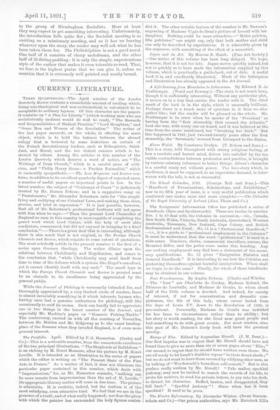CURRENT LITERATURE.
Tristan QUARTERLIES.—The April number of the London quarterly Review contains a remarkable amount of reading which, being non-theological and non-ecclesiastical, is calculated to be
acceptable to ordinary laymen. Of this character are the papers it contains on "A Plea for Liberty" (which working men who are socialistically inclined would do well to road), "The Rewards and Responsibilities of Medical Practice," "Lord Houghton," and "Some Men and Women of the Revolution." The writer of the last paper succeeds, on the whole, in effecting his main object, which is to hold the balance between the absurd eulogy that is bestowed by some historians on certain of the French Revolutionary leaders, such as Robespierre, Saint- Just, and Marat, and the too violent censure which is be-
stowed by others. Among the articles in this number of the London Quarterly which deserve a word of notice, are "The Writings of Dean Church," which is a careful piece of criti- cism, and "Philip Henry Gesso: a Puritan Naturalist," which is eminently sympathetic.—The Law Magazine and Review con- tains, in addition to its excellent quarterly digest of reported cases, a number of useful papers on important points in law. In the latest number, the subject of "Contempt of Court" is judiciously treated by Mr. Horace Nelson ; and in a suggestive essay on "Punishments," Mr. Alexander Robertson calls for "the simpli- fying and codifying of our Criminal Laws, and making them clear, precise, and brief in expression." It is just possible, however, that all of Mr. Robertson's professional brethren will not agree with him when he says :—" Than the present Lord Chancellor of England no man in this country is more capable of completing the grand work which Lord Cairns, with the help of most able coadjutors, commenced, but did not succeed in bringing to a final oonclusion."—There is a great deal that is interesting, although there is also much that is not original, in the Foreign Church Chronicle and Review, which consists to some extent of quotations. The most scholarly article in the present number is the first of a series upon German theology. The writer dilates upon the relations between Christianity and Hogolianism, and comes to • the conclusion that, "while Christianity may avail itself from time to time of the defence which a system like Hegers can afford, yet it cannot identify itself with any such." The small typo in which the Foreign Church Chronicle and Review is printed must be an obstacle to its excellences being appreciated by the general public.


































 Previous page
Previous page